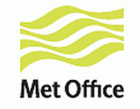Our Partnerships
ICAS extends the scale and scope of its research through collaboration with many external organisations.

- The Met Office Academic Partnership formalises a strong and productive working relationship with the University of Leeds which goes back several years. The partnership aims to secure the UK’s position as the world leader in weather forecasting and climate prediction, and also develop the atmospheric science leaders of the future. ICAS hosts several Met Office staff in Leeds.

The National Centre for Atmospheric Science (NCAS) is a world leader in atmospheric science, a multi-million pound research centre, funded by the Natural Environment Research Council (NERC). NCAS carries out research in climate science, atmospheric composition and air quality, physics of the atmosphere (including hazardous and extreme weather) and provides the UK community with state-of-the-art technologies for observing and modelling the atmosphere, including a world-leading research aircraft.
NCAS is distributed across UK universities with a headquarters in Leeds. In Leeds, ICAS is involved in many of the NCAS programmes, including boundary-layer meteorology, cloud physics, climate modelling and climate-chemistry-aerosol interactions. Find out more about NCAS at Leeds.
- The National Centre for Earth Observation is a research centre belonging to the Natural Environment Research Council. It provides NERC and UK universities with expertise and national capability in satellite-based Earth observation and data assimilation. NCEO helps to process the data obtained from satellites, maintains laboratory facilities and develops core UK data assimilation and inverse modelling tools, working closely with CPOM for studies of polar ice. NCEO is distributed across the UK, with its headquarters in Leicester. Here in Leeds, ICAS leads the chemical inverse modelling and data assimilation activities. We apply these models to test our understanding of atmospheric composition and to derive the fluxes of greenhouse gases.

- The Centre for Polar Observation and Modelling (CPOM) studies processes in the Earth's polar latitudes that may affect the Earth's albedo, polar atmosphere and ocean circulation, and global sea level. CPOM uses theoretical and laboratory-derived understanding to form new models of interactions between the ice, ocean and atmosphere, and uses ground and satellite observations to test the predictions of these and other climate models. CPOM is also part of the NCEO. As well as the School of Earth and Environment it has research groups at University College London and the Universities of Reading and Bristol.

- Leeds has a formal partnership with KIT that reflects our longstanding research cooperation with KIT's Institute for Meteorology and Climate Research. The partnership stimulates development of collaborative research projects, academic and scientific exchange, and exchange on graduate and postgraduate levels. Read about both sides of the partnership and activity between Leeds and KIT: www.see.leeds.ac.uk/research/icas/imk-partnership/.
